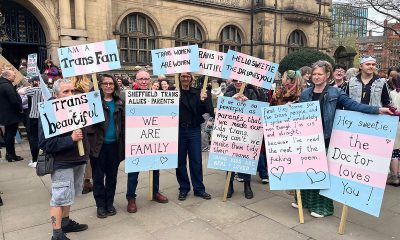European Union
Gay Lithuania filmmaker uses work to advance LGBTQ, intersex rights
Romas Zabarauskas came out in 2011 at Vilnius Film Festival

A gay filmmaker from Lithuania who describes himself as the “Baltic enfant terrible” uses his work to promote LGBTQ and intersex rights.
Romas Zabarauskas, 32, grew up in Vilnius, the Lithuanian capital.
He told the Washington Blade during an interview in D.C. in August that he initially wanted to be an actor, but soon realized he wanted to direct films.
Zabarauskas said the classic films — including John Waters’ “Pink Flamingos” and Douglas Sirk’s “All that Heaven Allows” —he watched in a local library exposed him to “the diversity of the world.” He also said Todd Haynes, Derek Jarman, Gregg Araki and other LGBTQ and intersex filmmakers “inspired” him.
“I enjoyed the diversity of the world,” he said. “It wasn’t just in terms of sexuality and gender identity, but also in terms of diversity of styles and ways of expression. It was amazing because it made me feel accepted.”
“It all sounds kind of trivial, but it’s true,” added Zabarauskas. “Cinema captures stories from all across the world in such different ways. That’s kind of amazing. I was definitely inspired by that.”
Zabarauskas studied at Paris 8 Vincennes Saint-Denis University from 2009-2011 and at City College of New York: Hunter College from 2011-2012.
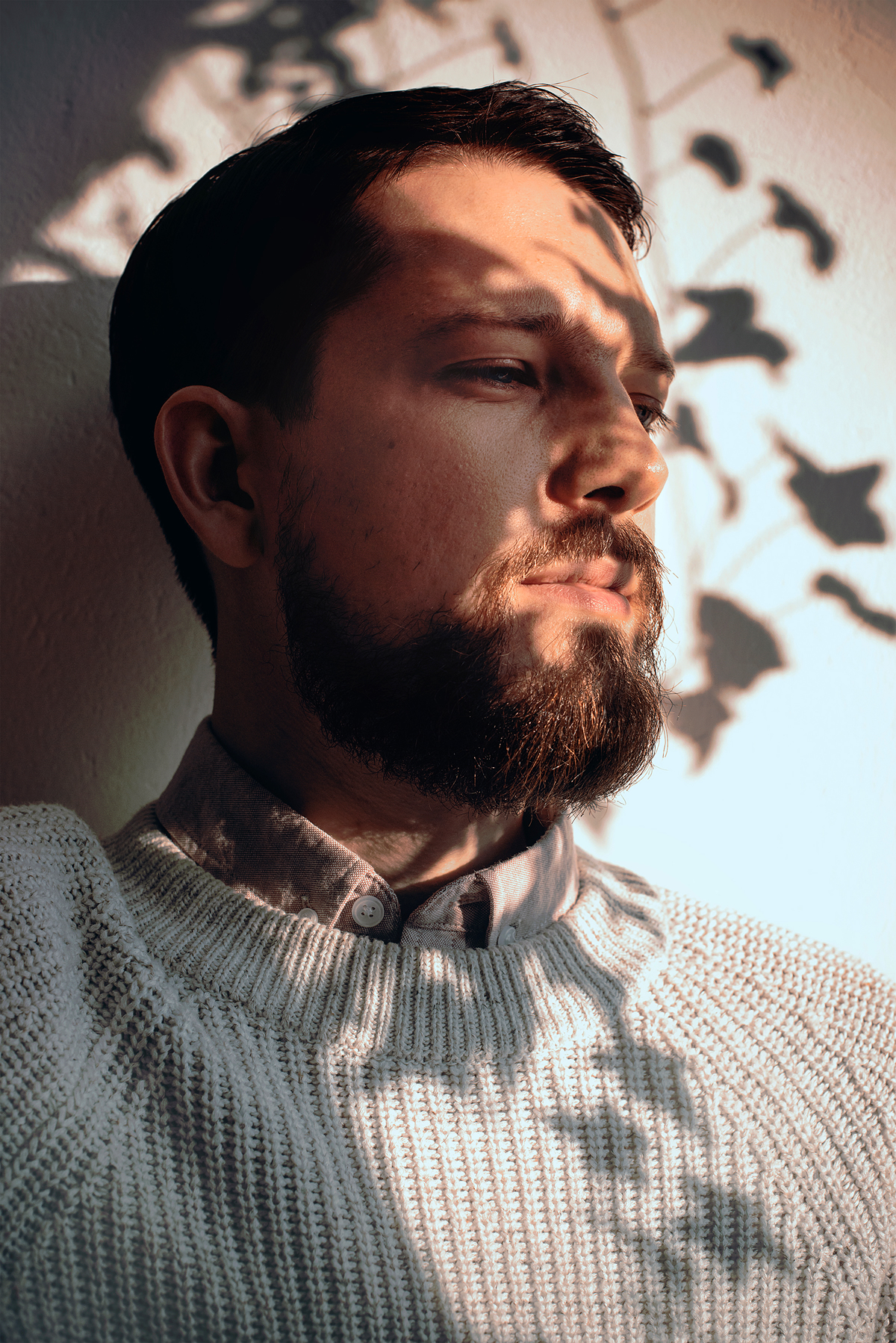
Zabarauskas’ first film, “Porno Melodrama,” which details a gay man’s decision to make a pornographic movie with his ex-girlfriend in order to make enough money for him and his boyfriend to leave Lithuania, premiered at Berlin Film Festival in 2011.
“There are many other films that have this kind of paranoia about gay villains, queer villains. I almost wanted to do something opposite,” Zabarauskas told the Blade while discussing the film. “It’s as though heterosexuality becomes this villain through the character of this villain, this ex-girlfriend. I wanted to play with that, allow myself that freedom to go very far. The title really hints more so, not to the erotic aspect of the film, because it’s not as explicit reality, but it’s more about the style of the film because it’s so out there.”
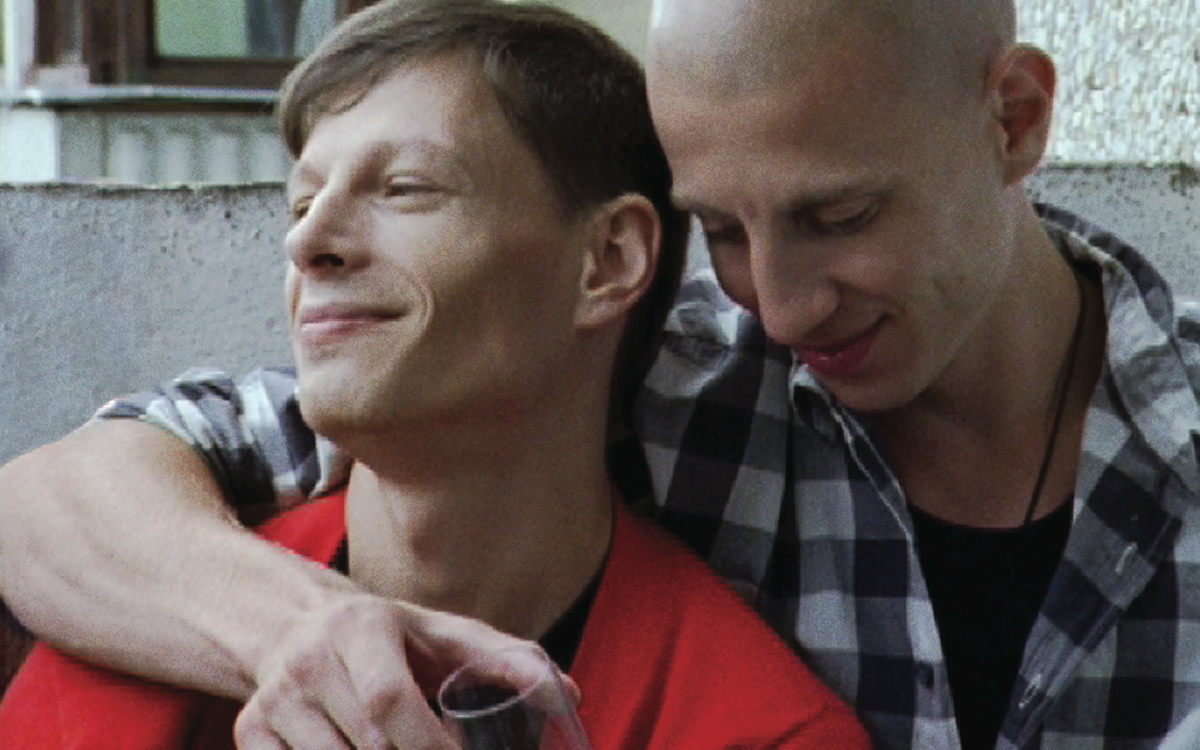
Zabarauskas came out as gay during “Porno Melodrama”‘s premiere at the Vilnius Film Festival.
“Very few people were out (in Lithuania) then in 2011,” he noted. “I got a lot of media attention … I talked about what it means to be gay on TV, print and all kinds of media.”
“It was a double-edged sword,” added Zabarauskas. “I was happy to contribute with my openness and I continue to do so today. On the other hand, I got so much pressure … the direct homophobia is understandable and easy to dissect. You know what it is, but then there was a lot of gray zone. I feel like I was trapped. I went under this huge scrutiny.”
The Berlin Film Festival then screened “Porno Melodrama.”
“I traveled the world, but then because I got so much media attention in Lithuania I was scrutinized by the critics and by film lovers and a lot of people (said) that I’m more of an activist,” said Zabarauskas. “I’m more of a public speaker than a filmmaker. The way I see it: Artists should be engaged or can be engaged, and it doesn’t contradict the art.”
The Lithuanian Film Center funded Zabarauskas’ third feature film, “The Lawyer,” which debuted in 2020.
“The Lawyer” highlights Marius, a gay corporate lawyer who forms what Zabarauskas describes as “an unexpected, human relationship” with Ali, Syrian refugee who is unable to leave Belgrade, Serbia, after his estranged father dies. Zabarauskas noted to the Blade that “The Lawyer” is the first Lithuanian film that portrays a male same-sex relationships and is one of the few made in Eastern Europe that shows LGBTQ and intersex refugees.
“I’m always interested in delving into very complicated political situations, but rather than to educate or send a direct message, I’m looking to find nuance and I’m looking to find interesting human drama,” he said. “I also don’t shy away from the kind of dialogue that they [Marius and Ali] have, in which they criticize [Syrian President Bashar] al-Assad. It’s so important not to forget that that was still ongoing and actually its fueled by Russia and by Putin.”
Lithuanian television showed “The Lawyer” for the first time on Nov. 11.
Lithuanian Shorts, in 2021 screened “Porno Melodrama,” which coincided with the film’s revival. Zabarauskas’ films have also been screened at the Tel Aviv International LGBT Film Festival and at New York City Pride’s human rights conference.
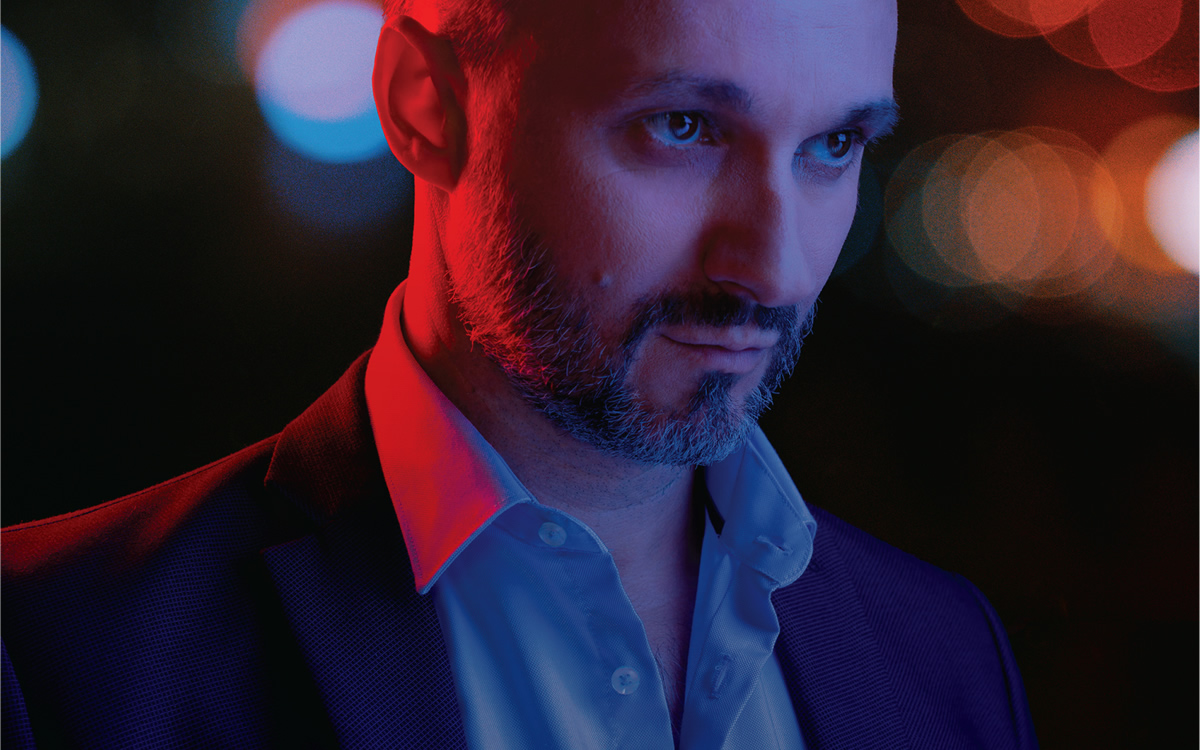
Zabarauskas spoke with the Blade nearly six months after Russia began its war against Ukraine.
Lithuania borders the Russian enclave of Kaliningrad and Belarus, whose president, Alexander Lukashenko, is a close ally of Russian President Vladimir Putin. Lithuania declared its independence from the Soviet Union in 1990, a year before it dissolved.
Zabarauskas noted then-Lithuanian President Dalia Grybauskaitė in 2014 labeled Russia a “terrorist state” after it annexed Crimea. Lithuanian MPs in May unanimously approved a resolution that described Russia’s war against Ukraine as an “act of genocide.”
“It’s the first time that I can be so proud of my country,” Zabarauskas told the Blade, referring to Lithuania’s posture towards Russia. “I’m actually very proud that Lithuania is right in terms of its foreign policy towards Russia and has been for a while.”
Zabarauskas acknowledged there is “fear” among Lithuanians about whether Russia will target their country, but he said, “that primal fear isn’t there anymore.” Zabarauskas also noted Lithuanians have welcomed Ukrainians into their homes.
“That’s been inspiring,” he said.
Gay U.S. ambassador ‘setting a personal example’
Lithuania bans discrimination based on sexual orientation and has lifted restrictions for male blood donors who have sex with men. Jessica Stern, the special U.S. envoy for LGBTQ and intersex rights, is among the more than 15,000 people who attended Baltic Pride 2022 in Vilnius in June.
Tomas Vytautas Raskevičius, the country’s second openly gay MP, is running to become Vilnius’ next mayor in 2023. Lithuanian Ambassador to the U.S. Audra Plepytė met with Zabarauskas when he was in D.C.
“Us artists, we have this opportunity to build bridges, to make pressure,” said Zabarauskas. “We sometimes have more freedom than politicians in what we can say and what we can do. I always try to use that in meeting diplomats and politicians and reminding them that the Lithuania LGBT+ is a part of Lithuanian society and we should celebrate our rights and our lives and that’s important.”
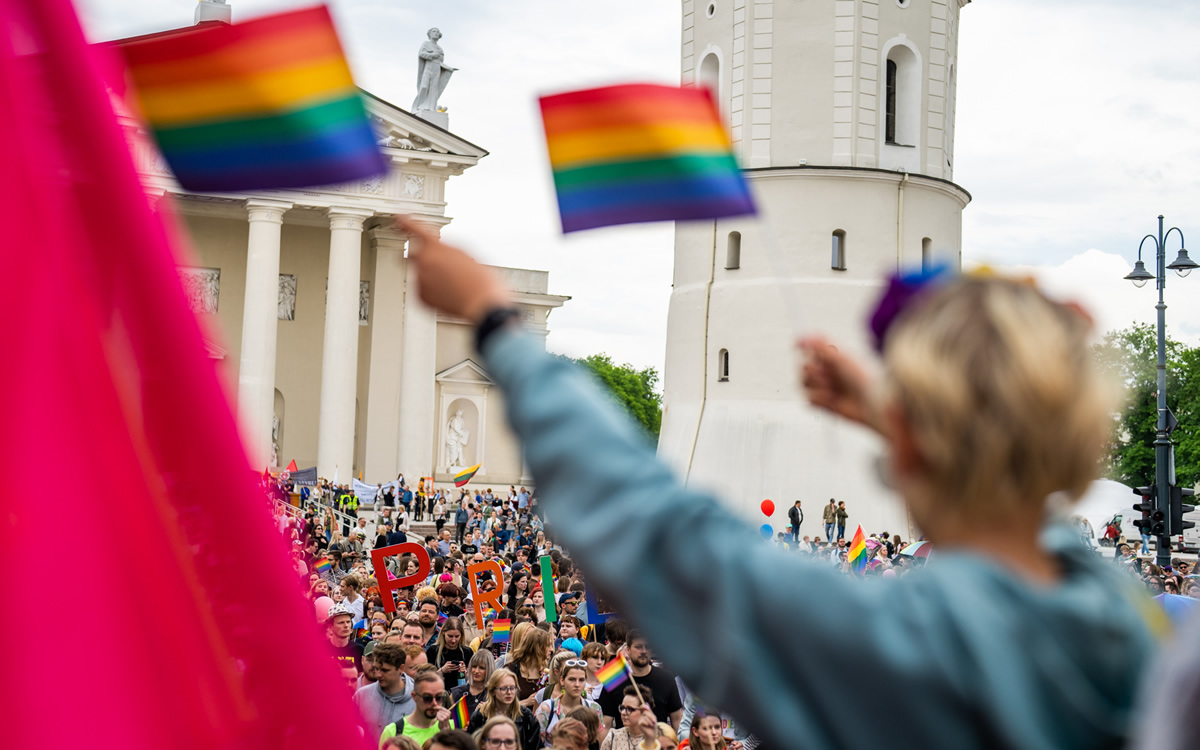
The Harvey Milk Foundation in 2021 honored Zabarauskas for his work. Zabarauskas noted this recognition to the Blade and applauded openly gay U.S. Ambassador to Lithuania Bob Gilchrist’s “personal leadership” on LGBTQ and intersex rights.
“I appreciate his leadership and I appreciate that he’s setting a personal example,” said Zabarauskas. “He’s making some impactful speeches at different events.”
Lithuania is one of only six European Union member states that do not legally recognize same-sex couples.
Ukrainian President Volodymyr Zelenskky in August announced his support for a civil partnership law for same-sex couples. Zabarauskas told the Blade he hopes Lithuanian lawmakers will follow the Ukrainian president’s lead and back an identical measure that has been introduced in Parliament.
“It’s so huge and a lot of people are inspired by those words, including in Lithuania,” said Zabarauskas. “I think it will be impactful in terms of our chances to get the civil unions law passed because it’s going to be very difficult to twist those words.”
Zabarauskas also said he and his fiancé want to get married in Lithuania.
“We got engaged earlier this year and we don’t want to get married abroad because it wouldn’t change anything in Lithuania,” he said.

European Union
EU countries ‘alarmed’ over Hungary’s worsening anti-LGBTQ crackdown
Budapest authorities have banned June 1 march

The governments of 20 European Union countries on Tuesday said they are “alarmed” over Hungary’s worsening anti-LGBTQ crackdown.
Hungarian lawmakers in March passed a bill that bans Pride events and allow authorities to use facial recognition technology to identify those who participate in them. MPs last month amended the Hungarian constitution to ban public LGBTQ events.
The Hungarian Helsinki Committee on Tuesday said police in Budapest, the Hungarian capital, have banned an LGBTQ rights march that was scheduled to have taken place on June 1. The Budapest-based human rights NGO in a press release said authorities cited the law that bans Pride events and other demonstrations “displaying homosexuality.”
Budapest Pride is scheduled to take place on June 28. The Hungarian Helsinki Committee and other groups, including the Háttér Society, a Hungarian LGBTQ rights organization, said they will challenge the ban.
“We are deeply concerned by recent legislative and constitutional amendments infringing on the fundamental rights of LGBTIQ+ persons which were adopted by the Hungarian parliament on March 18 and April 14, 2025, following other anti-LGBTIQ+ legislation already introduced in previous years,” reads a declaration that the Austrian, Belgian, Cypriot, Czech, Danish, Estonian, Finnish, French, German, Greek, Icelandic, Latvian, Lithuanian, Luxembourgish, Maltese, Dutch, Portuguese, Slovenian, Spanish, and Swedish governments issued.
“Under the pretext of child protection, these legislative amendments allow fines to be imposed on participants and organizers of events, such as the annual Pride celebrations,” it adds. “The amendments also allow for facial recognition software to be used at such events, and for banning such events. We are concerned by the implications of these measures on freedom of expression, the right to peaceful assembly, and the right to privacy.”
The governments stress they are “highly alarmed by these developments which run contrary to the fundamental values of human dignity, freedom, equality and respect for human rights, as laid down in Article 2 of the Treaty on European Union.”
“Respecting and protecting the human rights and fundamental freedoms of all people, including LGBTIQ+ persons, is inherent in being part of the European family. This is our responsibility and shared commitment of the member states and the European institutions,” says the declaration.
“We therefore call upon Hungary to revise these measures, to ensure the human rights and fundamental freedoms of all its citizens are respected and protected, thus complying with its international obligations,” it adds.
European Union
Gay US ambassador to Hungary marches in Budapest Pride parade
David Pressman has criticized government’s anti-LGBTQ crackdown

U.S. Ambassador to Hungary David Pressman on Saturday marched in the annual Budapest Pride parade.
Pressman, who is gay, posted to his X account pictures of him holding an American flag while standing behind a banner that read “United States embassy.” Pressman on Sunday spoke at Budapest Pride’s Family Pride Event that took place at his official residence.
“We’ve gathered for a celebration of families, of freedom, and of love — all things that are increasingly under attack for LGBT people in Hungary,” he said.
Pressman in his speech referenced a joint statement from 35 countries that expressed “serious concern about the targeting of LGBTQI+ people in Hungary, and called for the government to eliminate its discriminatory laws, policies, and practices.”
The U.S., Australia, Austria, Belgium, Bulgaria, Canada, Croatia, Cyprus, Czechia, Denmark, Estonia, Finland, France, Germany, Greece, Iceland, Ireland, Kosovo, Latvia, Lithuania, Luxembourg, Malta, Montenegro, North Macedonia, New Zealand, Norway, Poland, Portugal, Slovenia, Spain, Sweden, Switzerland, the Netherlands, the U.K. and Ukraine signed the statement alongside the U.S. and the General Delegation of Flanders, the Austrian Cultural Forum Budapest, the British Council, the Czech Centre, FinnAgora, Institut Français, Goethe-Institut, Instituto Camões and Instituto Cervantes.
“On the occasion of the 29th Budapest Pride Festival, we the undersigned embassies and cultural institutes express our full support for members of the lesbian, gay, bisexual, transgender, queer, and intersex (LGBTQI+) community in Hungary and their rights to equality and nondiscrimination, freedom of expression and peaceful assembly, and freedom from violence, among others,” reads the statement. “Respect for the rule of law and universal human rights are the foundations upon which democratic states are build. International human rights law is grounded on the broad premise that all individuals have the same rights and freedoms without discrimination.”
Pressman in his speech said the Family Pride Event took place “at a time when democracy itself — in this country and around the world — is confronting unprecedented and serious threats.”
“I’d like to talk with you this afternoon about freedom and democracy; and about those who instrumentalize love to undermine both,” said Pressman.
“The fact that LGBT people and democracy are both under increasing attack is no coincidence,” he added. “Those who seek to undermine democracy, traffic in fear; and, tragically, few currencies of fear continue to hold more value than the love in this community.”
Pressman further noted “posters all over Budapest during this political season fixated on you,” referring to LGBTQ Hungarians.
“It’s why your parliament adopted laws aimed at you, and your government is now implementing those laws to target you,” he said.

Pressman has been a vocal critic of Hungarian Prime Minister Viktor Orbán and of his government’s crackdown against LGBTQ rights that has grown worse over the last decade.
The U.S. ambassador in 2023 reiterated these criticisms during a Budapest Pride reception.
Budapest Pride spokesperson Johanna Majercsik earlier this month told the Washington Blade that Pride “is a particularly important event in Hungary.” (The Blade in April traveled to Budapest, and interviewed Majercsik and other Hungarian activists.)
“Despite being a full member of the European Union since 2004, the Hungarian government has systematically reduced the rights of the LGBTQ+ community,” said Majercsik. “The government apparently doesn’t want to stop there, inciting people against our community, and making references about passing new anti-LGBTQ laws in the future (calling them child protection laws).”
European Union
The 2024 European elections: A turning point for LGBTQ rights in the EU?
Right-wing parties made electoral gains
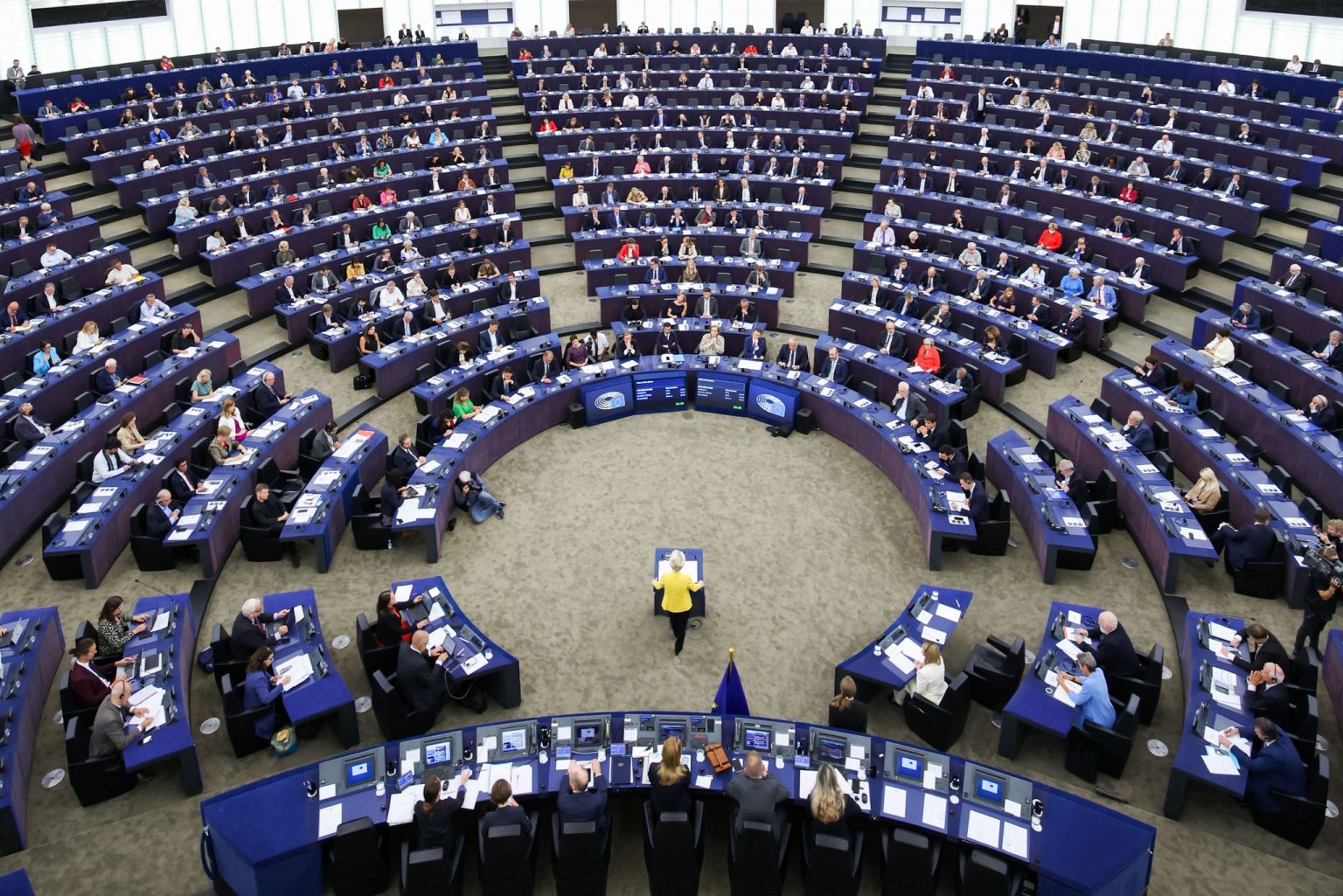
As the dust settles after the 2024 European Parliament elections, right-wing parties are gaining substantial ground and concerns about the potential impact on LGBTQ rights are growing. The projected surge in support for far-right parties, however, was not as pronounced as some had expected.
Monday morning’s estimates indicate the far-right’s presence has, however, undeniably increased.
The European Conservatives and Reformists (ECR) gained four seats, bringing their total to 73. The Identity and Democracy group saw a significant rise, gaining nine seats to reach 58. Together, these nationalist, anti-immigrant parties now hold around 130 seats, reflecting their growing influence. Marine Le Pen’s National Rally in France, which clinched over 32 percent of the vote, and the Alternative for Germany securing approximately 16 percent of the vote and becoming the country’s second-largest party, ahead of Chancellor Olaf Scholz’s Social Democrats, in particular could affect the broader political dynamics in Europe.
Despite the gains for the far-right, the mainstream conservative European People’s Party (EPP) emerged as the largest group, securing 189 seats, an increase of 13 seats. The two other centrist parties, the Progressive Alliance of Socialists and Democrats and Renew Europe, however, experienced losses that eroded the political center. S&D finished with 135 seats, losing four, while Renew Europe saw a significant reduction, finishing with 83 seats.
European Commission President Ursula von der Leyen celebrated her party’s victory and called for cooperation among centrists to ensure a “strong and effective Europe.” She emphasized the responsibility that comes with the election results, noting the need for stability amid growing support for extremist parties.
The election’s biggest losers were the Greens, who saw their support decrease by 25 percent, ending with 53 seats. The Greens, despite this setback, could still play a crucial role in supporting centrist majorities as an alternative to further-right parties.
All eyes are now on the election winners, the EPP.
Von der Leyen has indicated her readiness to work with certain parties sitting with the hard-right ECR. Initial signals from the EPP camp, however, suggest it will stay true to its traditional allies at the center. Von der Leyen has offered to work with socialists and liberals to build a “majority in the center for a strong Europe,” underscoring the importance of maintaining a united front against extremism.
The narrow margins in the new parliament could lead to issue-by-issue coalitions, especially for sensitive issues such as those related to the European Green Deal. This limited room for maneuver could see the EPP relying on partners to its right on an ad hoc basis, including for critical decisions that include ushering in a new commission president. Von der Leyen’s future hangs in the balance as she seeks re-election. National delegations within her EPP grouping and support from lawmakers of Giorgia Meloni’s Brothers of Italy party, which clinched 24 seats, will play a crucial role in her bid to secure an absolute majority of 361 MEPs.
The implications for LGBTQ rights in Europe are significant.
Far-right parties, known for their conservative social values, might push for policies that restrict LGBTQ rights, opposing marriage and adoption by same-sex couples, and challenging the legal recognition of gender identity and access to healthcare for transgender people. Such potential policy reversals represent a significant setback for the LGBTQ community.
The rising popularity of far-right ideologies also poses a risk of heightened discrimination and hate speech against LGBTQ people.
Hate-motivated violence and exclusion are likely to become more prevalent, along with more frequent and aggressive hate speech targeting the LGBTQ community. Additionally, far-right parties often promote traditional gender roles and family structures, potentially undermining the visibility and acceptance of LGBTQ identities. Nonbinary, transgender, and intersex people could face increased stigmatization.
The 16th annual Rainbow Map that ILGA-Europe publishes underscores the importance of legal protections for LGBTQ people.
Authoritarian leaders across Europe continue to use the scapegoating of LGBTQ people to divide and mobilize their electorates. Several countries, however, have demonstrated robust political will to advance and protect LGBTQ rights. Some countries — Germany, Iceland, Estonia, and Greece — have made significant strides in protecting LGBTQ rights through improvements in legislation and anti-discrimination measures. Belgium, Cyprus, Norway, and Portugal have introduced bans on conversion therapy practices.
Countries such as Italy, on the other hand, show the consequences of stalling legislative protection for LGBTQ people. Moreover, EU accession countries, including Turkey and Georgia, are actively eroding human rights and fundamental freedoms.
The Rainbow Map illustrates the stark differences in how European countries handle LGBTQ rights.
While some nations are making significant progress, others are regressing, influenced by the far-right’s growing power. Germany, Iceland, Estonia, and Greece, for example, have made noteworthy improvements in their legal frameworks to protect LGBTQ people. Germany prohibited hate crimes based on sexual orientation, gender identity, and sex characteristics, while Estonia and Greece amended their laws to allow same-sex couples to marry and adopt children.
In contrast, Italy, which has dropped in the rankings due to stalling legislative protections, exemplifies the risk of complacency that many activists in Europe fear. The far-right’s influence can quickly lead to the erosion of rights if proactive measures are not taken. The situation is even more dire in EU accession countries such as Turkey and Georgia, where LGBTQ rights are actively being rolled back.
The stakes are high as Europe moves forward from these elections.
The EU must address the rise in political hate speech and new tools of oppression that include Russia’s criminalization of the LGBTQ movement. Without strong laws and policies to protect LGBTQ people, the foundation of safety, rule of law, and democracy in Europe is at risk.
The balance of power remains delicate as the European Parliament prepares for its new term.
The first major test will be the approval of the new European Commission president, which is set for July. Von der Leyen, who narrowly won her position five years ago, will need to secure broad support among centrists while navigating the complex dynamics of the new parliament. The secret ballot process adds an additional layer of uncertainty, making her re-election far from guaranteed.
The 2024 European elections have set the stage for potentially significant changes in the legislative and social landscape of the EU. As right-wing parties gain power, the fight for LGBTQ rights becomes more crucial than ever. The next few years will be pivotal in determining whether Europe can uphold its commitment to human rights and equality or if it will see a regression influenced by nationalist, conservative ideologies.
-

 U.S. Supreme Court4 days ago
U.S. Supreme Court4 days agoSupreme Court upholds ACA rule that makes PrEP, other preventative care free
-

 U.S. Supreme Court5 days ago
U.S. Supreme Court5 days agoSupreme Court rules parents must have option to opt children out of LGBTQ-specific lessons
-

 Television5 days ago
Television5 days ago‘White Lotus,’ ‘Severance,’ ‘Andor’ lead Dorian TV Awards noms
-

 Music & Concerts5 days ago
Music & Concerts5 days agoBerkshire Choral to commemorate Matthew Shepard’s life





